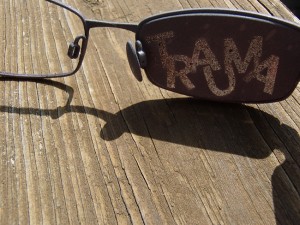
Photo Credit: Margaret Bellafiore
“You can recover from all that happened to you.”
Sebern Fisher, author of Neurofeedback in the Treatment of Developmental Trauma: Calming the Fear-Driven Brain
That was the dose of hope I received from Fisher during a telephone call this summer when she took time out of her busy life to speak with a trauma blogger. As wonderful as it was to hear her say these words you can FEEL them by reading her book.
The writing is excellent. She helps explain why and how developmental trauma devastates and also why and how it is different than single-incident trauma or traditional post-traumatic stress.
Honestly – if you read her work only to understand the pervasive and tortuous impact of ambient fear – it’s worth your time and money. Her book is about neurofeedback but that’s not what I’m reviewing here (though you can hear her speak on that topic TODAY – here).
Ambient fear ravages a body, brain and life the way a flu can take over the best intentions to work or work out. Whether it’s a “low grade” fever of fear or a spiked fever cooking the brain or some fluctuation between the two – fear consumes, exhausts and strains the body. SHE GETS IT!
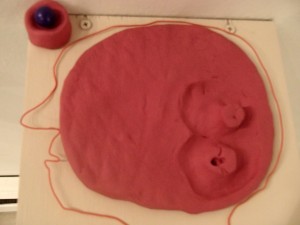
Brain stuck in trauma doing a figure eight and unable to move through the whole brain (and life). Photo credit Margaret Bellafiore and work done for interactive trauma installation. at https://healwritenow.com/body-language-trauma-exhibit/
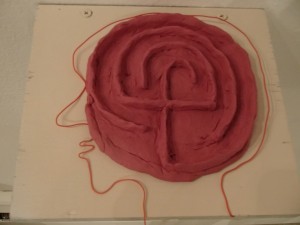
Non fearful brain that has full access (labyrinth) tuck in trauma doing a figure eight. Photo credit Margaret Bellafiore and work done for interactive trauma installation. at https://healwritenow.com
SHE GETS IT!
Of her own own experience with a “hyper-startle response that I had lived with for most of my life,” she writes, “I’d been aware that I would send a stalking horse out before me to deal with new social encounters, but this insight had done nothing to diminish its presence or the innate sense of its necessity.” She isn’t talking only about social anxiety.
“Fear not only grabs the mind, it overtakes the brain. I knew that I dealt with chronic fear, but I thought about it exclusively as my mind’s reaction to my history.”
ME TOO!!!
THIS RESONATES FOR MANY!
Not all therapists or trauma experts understand the neurobiology of toxic stress or how to work with those who in the passenger seat to a scaredy-cat brain at the wheel. Fisher explains how neglect and poor family attachments always co-exist with traumatic abuse. Indeed, it’s the cumulative impact of that cluster-f*!k which makes healing so difficult, complex and so very necessary.
“The unbonded, motherless (not only literally) child lives in the CNS of a prey animal, with predators all around her, both real and imagined, and always anticipated. Empathy cannot develop, much less flower, in a being terrified of its own imminent extinction.” Plus, if there’s abuse in the family the child may even be worrying about the mother’s survival – again – not optimal for brain development.
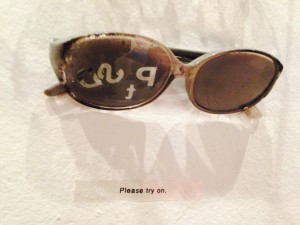
Photo credit Joe Atwood. Work done for interactive trauma installation. at https://healwritenow.com
“Unrelenting ambient fear makes empathy impossible. It is like asking a person who is being mugged to feel kindred feelings for the attacker while being attacked,” she writes.
I love this woman. She knows, as adults with developmental trauma we remain related to and often in relationship with those who caused our traumatic lifestyle and/or who responsible for our care and/or bystanders during neglect.
This isn’t about blame it is about understanding why we lot of triggers in the present which never get put in the past and which help keep the “fear-driven brain” fearful.
To attend a holiday event, for example, one may have to enter a home where molestation happens which will impair the ability to enjoy dip or conversation.
This sucks not only for the person who is triggered afraid but for those family members who weren’t abusive or neglectful. We arrive as a shell of our true selves with a body filled with numbness or terror standing in where a present soul and psyche should be.
It’s not that we keep hitting the same play button to a bad or tired DVD because we love to revisit pain. No, we go back to old movie scenes and are supposed to get the action that was taped in our bodies which is near impossible while sober or self-aware. 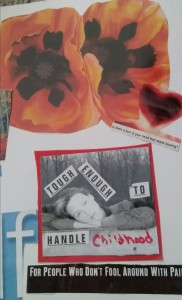
No one would expect a survivor of rape to picnic at her rape site or for a veteran to have fireworks at every party but the equivalent is expected of survivors of developmental trauma.
No matter how resilient and recovered a person the constant triggering on a regular or semi-regular basis wears 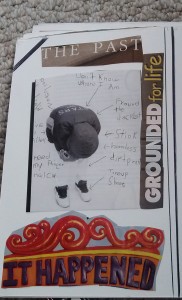 one down. It may be tolerable but is never enjoyable. Usually, we have to choose between a betrayal of self or staying isolated from loved ones.
one down. It may be tolerable but is never enjoyable. Usually, we have to choose between a betrayal of self or staying isolated from loved ones.
We love our loved ones and may genuinely wish to be with them – but also safe. Often we are forced to choose because our loved ones wish or think we should be able to “get over” the hurt so we can just “get along and go along” despite the consequences.
This usually isn’t fun. Plus, developmental trauma doesn’t happen to one person in a family. Our loves ones are often doing battle with their own triggers, conflicts, divided loyalties, symptoms or issues acknowledged or denied. Though we may be treated as one cracked egg in an otherwise fine carton – that ain’t how it works – ever.
Families where developmental trauma occurs are a crockpot of competing ambient fears. Fisher gets the complexity of this particular form of trauma in a way few others have. Plus, she totally gets the whole mother thing.

“It is difficult to imagine that a child whose biological mother is present, attuned and attentive, would be subjected to the physical, sexual or emotional assaults that can, and usually do, lead to a diagnosis of PTSD” Fisher writes.
As a feminist, my felt sense of rage at my own mother and my heroin-like addiction for a form of soothing that could never be provided was at odds with my politics. I was confused because intellectually I knew my mother was a teenager when she had kids and had abusive partners. She too was a victim – their victim – but to me she was a perpetrator or neglect.
My brain can and does feel for the young girl and mother she was who has so much responsibility and so little help, so much chaos and her own trauma. I believe she wanted the absolute best for her children. And of course – I love her.

Photo Credit: Joe Atwood
But in my heart, childhood was a room that was housed in my mother. She was the one who kept opening the door to every person who would violate and hurt me, leaving us unsupervised and in danger.
In my heart, she is the one who invited every perpetrator into my life and the one who let them share house, room and even my bed and body – for years. She is the one who even after they were gone gave them the benefit of the doubt and blamed me for “thinking” I was abused.
Imagine if you were raped or robbed and your mother defended the attacker and blamed you for the crime? This is the common reality for those with developmental trauma. And not surprisingly that makes for some strained relationships between even the most evolved survivor and his/her mother.
Plus, for many of us, abuse ends in and during childhood where the neglect and denial are ongoing and can continue right up through to the present – which also makes abuse hard to get over and beyond and move past.
This is the aspect of developmental trauma people write to me about most. This is the issue that pains, confuses and haunts many survivors. It is also least understood by a culture that wants any grown adults to be nice to their mothers no matter what. How Fisher talks about a functional form of motherlessness even when a mother is alive is illuminating.![file4681275234167-265x150[1]](../wp-content/uploads/2014/03/file4681275234167-265x1501.jpg)
“The good-enough mother naturally protects her child. When traumatic events occur that are beyond her control, she validates them and helps her child recover from them. This can mean the difference between experiencing a traumatic event and becoming traumatized.”
Empathy after can be the difference and it’s sorely lacking for those traumatized in the family. Again, it must be said – SHE GETS IT!
As a parent I’ve written about how it is the absence of good more than the presence of bad, in childhood, which impacts me most now. I have tried to articulate how and why but without any language. Fisher to the rescue.
I remember when I read the book I Can’t Get Over It by Aphrodite T. Matsakis PhD. during a time when all traumas were presumed to be the same. There was no “it” to get over. The “it” was an entire childhood or lifestyle – not incidents or events. Even now, brilliant trauma advocates constantly speak about life before and after trauma as though we all had this line in space and time.
Trauma was baked into our bone marrow and skin. Our entire inner and outer lives may were shaped and formed in and by abuse and neglect for years if not decades. The problem is that there is no pre-trauma self but only a self via trauma.
We are building a healthy self – often from scratch – as adults. We are trying to learn the opposite of what we learned and lived with (that’s why my blog is sub-titled how to live on earth when you were raised in hell, because many of us ask how, how, how all of the time.

Photo Credit: Margaret Bellafiore
We are trying to learn what others learn when there is good attachment, good bonding, good relationships, good nutrition, education and information about love. You know – all the stuff that teaches us to relate to our own needs and desires as well as lovers, friends and children.
I don’t know any survivors of childhood abuse who yearn for a pre-trauma self but for a self free of trauma. Most are trying to understand who we if and when we can extract shame, self-disgust, self-doubt and all those heirlooms left buried in our beings.
This might be the work of an entire life – figuring how to be real, open and honest, able to feel, be, trust, love, parent and be interdependent. When I was younger I wanted and needed to hear from and about women who went on to live and love well after having been raised in hell. Now I know that is possible – not easy – but possible.
I don’t know Fisher’s personal story but I can feel that she understands this journey and for that I am grateful to and interested in her work. She is a true pioneer and advocate.
Someone said to me recently – you’re a sherpa for other survivors. It’s a huge compliment and honestly I can’t claim that title for myself. But I think that’s what Fisher is. She has taken on the mountain – the human brain – and helped us scale it and understand the dragon of fear that resides within for those of us with developmental trauma. She insists that there are ways to ease fear and do more than white-knuckle a life.
Because of her work – I know there’s higher for me to climb.
Fisher is a world-class sherpa who knows the landscape and hazards as few others do. All of us who follow are indebted to her work, her compassion and her wisdom.
In the second blog post about Fisher I will share more about neurofeedback itself and why and how she believes it is so effective as well as how people can pay for this expensive therapy.
Further Reading
To buy Sebern Fisher’s book, go here:
In her own words, you can read about it here.
If you want to listen to the fantastic audio done by Michele Rosenthal of Change You Choose, go here
You Matter Mantras
- Trauma sucks. You don't.
- Write to express not to impress.
- It's not trauma informed if it's not informed by trauma survivors.
- Breathing isn't optional.
You Are Invited Too & To:
- Heal Write Now on Facebook
- Parenting with ACEs at the ACEsConectionNetwork
- The #FacesOfPTSD campaign.
- When I'm not post-traumatically pissed or stressed I try to Twitter, Instagram & Pinterest.
Hello Cissy,
This is my first visit to your site, I have only read this page and I am compelled to comment. I arrived here by searching Sebern Fisher, after listening to her webcast on nicabm.
You have articulated so well the experience of trauma on going throughout life. I kept shaking my head yes at every sentence. When I read “the absence of good more than the presence of bad”, I knew I was home. I have been saying for sometime, it is not what happened but what did not happen that causes the most damage. When we receive what we need in the aftermath of an experience, the guidance, empathy, comfort and connection, we can form resilience instead of distorted self concept and copeing. It is not what happened but how we emerged from it that forms our expectations and beliefs in our ability and worth to ourselves and the world. Of course, a healthy response to trauma is rarely, if ever experienced in the home that allowed/created it. I invite you to check out my site which has a simple way to do this today, with amazing results. It is no coincidence that I saw the webcast today, you posted this today and I am personally working on managing my fear of “getting the word out about Life ReScripted”. I have more to learn personally about fear, no, actually terror and how to cope, continue, transform it and I am sure this will also enhance Life ReScripted. However, I wish it would be easier, “just do it” has worked for fear but is not working for terror.
As a side note I have used neurofeedback and had excellent results. Also I love your title of World Class Sherpa! I will return to your site often and recommend to others.
Thank you for the work you do!
Vicki
Vicki,
Welcome and I love the images on your website and what I’ve read so far. I look forward to learning more. One of the best parts of having this website is learning about others doing work so we can share, gather resources, energy and help ourselves and each other. YES! Thank you for reaching out. It means EVERYTHING TO ME that the writing speaks to you. EVERYTHING. That’s the reason I do it.
Warmly,
Cissy
Ok…..great ditty on Neurofeedback
I am in neurofeedback for a few months now and I last friday had my 21st session.
Slow but steady progress of lessened anxiety, hyper vigilance, ocd and better sleep.
Memory of my unbelievable rapes and invalidation are coming back as almost a cathartic cleansing of my soul before I finally recover after 40 years of dissociation, depression, self defeating behavior…..
Glad my psycho dynamic therapist is opening her schedule up for my neurofeedback “cleansings.”
Why on God’s green grass do ppl rape, invalidate, conditional love, bully when many..not all will have life long negative effects of the treatment.
It’s easier to be nice, kind and caring then be an sob, rapist, bullier…….
And most importantly……validate yourself and have correct and healthy boundaries and love your self unconditionally!
I wish I learned this wisdom earlier:
“Validate yourself and have correct and healthy boundaries and love your self unconditionally!”
Thank you. And so many LOVE neurofeedback and someday I hope to try it. It’s good to hear testimonials and that it feels like cleansing. I do believe that “hurt people hurt people” saying but it doesn’t mean all the pain caused and inflicted doesn’t hurt or that I always understand the choices people make….
This though, is key… not easy, but key:
“Validate yourself and have correct and healthy boundaries and love your self unconditionally!”
Cis